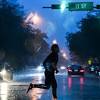Hong Kong Publisher Jimmy Lai Arrested Under New National-Security Law

- Biography
- @LyonsNotes
- John.Lyons@wsj.com
Jimmy Lai, the outspoken publisher of Hong Kong’s popular pro-democracy newspaper Apple Daily, was arrested on suspicion of foreign collusion under a new national-security law, widening Beijing’s crackdown on the former British colony.
Police arrested Mr. Lai at his home Monday morning and informed him he faced national-security charges, according to Mark Simon, an executive at his company. His two sons and four employees from his publishing company were also arrested. Hong Kong police said at least nine people were arrested throughout the day on national-security and other charges, including fraud.
The arrests sent troubling signals about the future of the free press in Hong Kong. About 200 police also raided Apple Daily’s newsroom, stringing up cordons in and around reporter cubicles as newspaper staffers live-streamed the raid.
At one point, police brought a shackled but serene-looking Mr. Lai into the newsroom.
“This is for sure thwarting the freedom of press, it’s needless to say,” Mr. Lai, who is in his 70s, said in Cantonese on the live stream.
So far, Mr. Lai’s is the most significant arrest made under the new national-security law. He is a towering figure in Hong Kong, and his newspaper was a thorn in the side of the city’s pro-Beijing leadership during the months of massive peaceful protests and violent clashes with police that rocked Hong Kong last year.
China imposed a broadly worded national-security law on Hong Kong on June 30 to snuff out a yearlong pro-democracy uprising. The decision to impose the law reflects a calculation by President Xi Jinping that it is worth risking the city’s viability as a lucrative marketplace in order to crush dissent, observers say.
Hours before the security law was enacted, Mr. Lai adopted a defiant tone. He said he would keep publishing and remain in Hong Kong so he could fight for his beliefs.
“We are the obvious target. Whatever we write, or whatever we say, they can label secession or subversion or whatever they decide according to their expedience,” Mr. Lai said in an interview.
“They want to intimidate me, to frighten me to leave, so that I disgrace myself, discredit Apple Daily and undermine the solidarity of the pandemocrat movement,” he said.

Hong Kong has become a key flashpoint in U.S.-China relations, which were already strained over issues like trade, information security, human rights and the militarization of the South China Sea. Given Mr. Lai’s stature, his arrest may add a personal dimension to the tension, given that senior American officials met with him just last year.
Mr. Lai traveled to Washington to meet with U.S. officials, including Vice President Mike Pence, to speak about Hong Kong, an activity that would now likely breach the security law’s foreign-collusion strictures, although the law is explicitly not retroactive.
Mr. Pence said in a tweet that Mr. Lai’s arrest is “deeply offensive & an affront to freedom loving people around the world.” He said at their meeting Mr. Lai’s commitment to democracy and the autonomy of Hong Kong impressed him.
Secretary of State Mike Pompeo, in a tweet, said Mr. Lai’s arrest is further proof the Communist Party “has eviscerated Hong Kong’s freedoms and eroded the rights of its people.”
The security law places special emphasis on preventing foreign influence on Hong Kong affairs and makes lobbying overseas governments—for sanctions and other measures—a crime.
Mr. Lai was a prominent figure in a full-court press on Washington last year by democracy advocates who sought to encourage U.S. lawmakers to pass Hong Kong-related legislation, including the Hong Kong Human Rights and Democracy Act. It eventually passed unanimously.
The U.S. responded to China’s crackdown with multiple actions, including sanctioning the city’s Beijing-backed leader, Carrie Lam, and other officials in recent days.
Authorities had already made some other arrests so far under the law, including four young activists who had called for Hong Kong independence online and a motorcyclist who hoisted a large black Hong Kong independence flag during a protest on July 1 and then ran into a group of police officers.
Critics of the national-security law, including Mr. Lai, have called it the death knell for the Western-style freedoms enjoyed by Hong Kongers since the city was returned to China in 1997. Institutions such as independent courts and free-speech guarantees that didn’t exist on the mainland allowed Hong Kong to thrive as an East-West gateway for investment capital.
In his June 30 interview, Mr. Lai said China’s crackdown would erode the rule of law in Hong Kong and destroy its special status as a global financial center.
“Billions of dollars are transacted in seconds here, and without the rule of law there will not be mutual trust, and without mutual trust, transactions of billions in seconds are impossible,” he said. “I am sure that in five years, Hong Kong will not be what it is today.”
Mark Simon, the executive at Mr. Lai’s company, said he expected police to file multiple charges against Mr. Lai and the other people who were arrested after questioning them and searching their homes.
Police said a news briefing on the arrests would be held later Monday.

Mr. Lai was already facing charges, including unlawful assembly, for participating in large marches that drew hundreds of thousands into Hong Kong’s streets last year. The national-security charges are more consequential. Under the new law, foreign collusion carries a sentence of up to life in prison.
A successful entrepreneur who got his start in the garment business, Mr. Lai has angered China as an unapologetic promoter of free speech and critic of the Beijing government going back to the People’s Liberation Army’s 1989 massacre of students around Tiananmen Square.
Last year, Chinese state media named Mr. Lai as one of a “Gang of Four” veteran democracy campaigners, which also included 82-year-old barrister Martin Lee. State media said they incited Hong Kong’s unrest with the help of Western agents—allegations they deemed absurd.
Mr. Lai’s life story evokes the broader story of Hong Kong’s free-market rise. He was born in mainland China on the lower rungs of the economy and spent much of his childhood as a street vendor. He came to Hong Kong as an adolescent while it was still a British colony and labored in the garment industry.
Eventually he earned enough money to go into business for himself as a manufacturer, and by the early 1980s he was taking garment orders from large American retailers. He created a brand, Giordano, which he named after a New York pizza parlor.
Mr. Lai was called to activism by the Tiananmen Square protests. He started printing pro-democracy slogans on T-shirts at his Giordano stores.
- Hong Kong’s Security Law Explained
- What to Know About Jimmy Lai
- U.S. Sanctions Chinese Officials Over Hong Kong Policy—Including Carrie Lam
- Hong Kong’s Exiled Dissidents Become Fugitives From China
- Hong Kong Draws Fewer Expats as China Curbs City’s Freedoms
- Media Companies’ Fears Stoked
He founded a popular magazine that attacked Beijing officials who were responsible for the massacre—while also dishing out gossip and racy content to keep issues flying off newsstands.
And he paid a price for it: Giordano stores on the mainland were shut down and Mr. Lai was eventually squeezed out.
Apple Daily became one of Hong Kong’s most widely read broadsheets by publishing unflinching journalism. But it hasn’t been without incident. Over the years, Mr. Lai has had offices firebombed and lived with staff of rival newspaper camped outside his home to report on his comings and goings.
During last year’s protests, the paper was a must read for pro-democracy Hong Kongers, who are in the majority, according to polls. The paper published investigations into allegedly improper police housing and printed posters for some protests.
—Joyu Wang contributed to this article.
Corrections & Amplifications An earlier version of this article said Jimmy Lai is 70. (8/9)
Write to John Lyons at john.lyons@wsj.com
Copyright ©2020 Dow Jones & Company, Inc. All Rights Reserved. 87990cbe856818d5eddac44c7b1cdeb8


 United States
United States Argentina
Argentina  Australia
Australia  Austria
Austria  Brazil
Brazil  Canada
Canada  Chile
Chile  Czechia
Czechia  France
France  Germany
Germany  Greece
Greece  Italy
Italy  Mexico
Mexico  New Zealand
New Zealand  Nigeria
Nigeria  Norway
Norway  Poland
Poland  Portugal
Portugal  Sweden
Sweden  Switzerland
Switzerland  United Kingdom
United Kingdom 
























